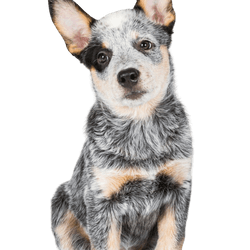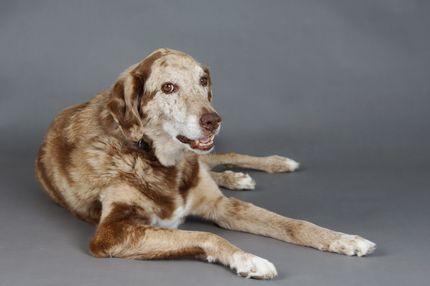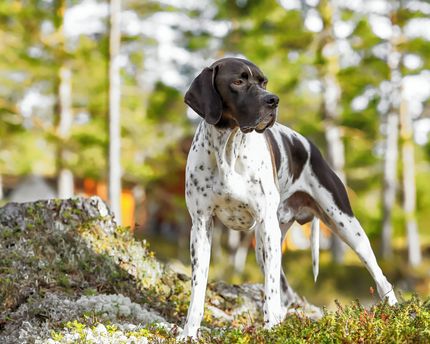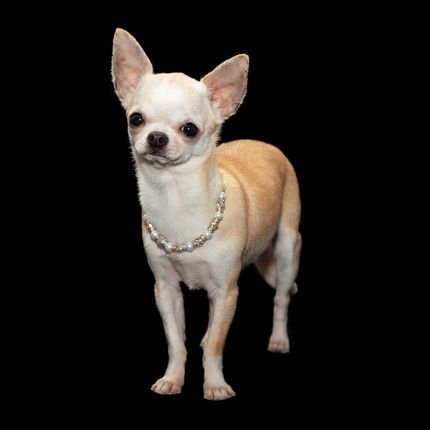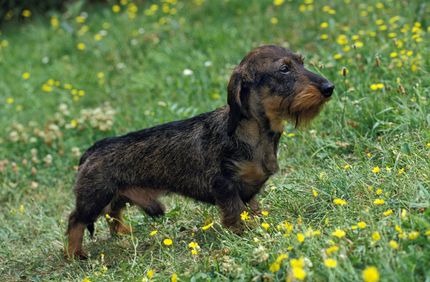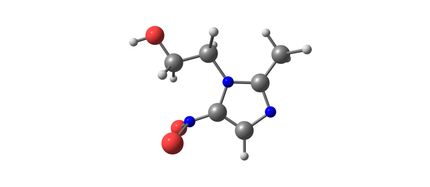Facts & Origin
Box Heeler - The fascinating mix of Boxer and Australian Cattle Dog.
The Box Heeler is an exciting hybrid breed created by crossing the Boxer and the Australian Cattle Dog. This combination of two energetic dog breeds results in a versatile and robust dog known for its intelligence and working ability.
The exact history of the Box Heeler's origin is not well documented, as it is a relatively new hybrid breed. However, it is believed that this cross was bred with the goal of combining the physical strength and endurance of the Boxer with the working ability and herding instinct of the Australian Cattle Dog.
Suitability and Use
The Box Heeler is an excellent working dog and companion due to his intelligence and willingness to work. His versatility and energy make him an ideal partner for active people and families. He is well suited for various activities such as agility, obedience training and dog sports. Because of his herding instinct, the Box Heeler can also be used in rural areas to herd livestock.
| Alternate Name | - |
| Origin | Australia - Germany |
| Life expectancy | 10 - 15 years |
| Care requirements | low-maintenance |
| Activity level | average - average to high |
| FCI group | not recognised |
| AKC group | not recognised |
| KC group | not recognised |
More Australian Cattle Dog mixes
More Boxer mixes
Attitude, character and temperament of the breed
Possible character traits of the Box Heeler
The Box Heeler probably has the following character traits:
- Intelligent: The Box Heeler is known for his intelligence and quick perception.
- Eager to work: He shows a strong willingness to work and likes to be actively busy.
- Loyal: The Box Heeler develops a close bond with his owners and is devoted to them.
- Protective Instinct: Because of his protective instinct, he is alert and can be a good watchdog.
- Social: With proper socialization, the Box Heeler gets along well with other dogs and animals.
The Box Heeler is a fascinating blend of Boxer and Australian Cattle Dog. With his intelligence, eagerness to work, and versatility, he makes an excellent working dog and companion. His energy and loyalty make him an ideal pet for active people and families. With proper care and veterinary attention, the Box Heeler can lead a healthy and fulfilling life and bring much joy to his owners.
Health and care
In terms of health, the Box Heeler usually inherits the hardy nature of both parent breeds. However, it is important to watch out for certain health problems that can occur in the parent breeds. These include hip dysplasia, elbow dysplasia and eye problems. Regular veterinary examinations and proper care, including regular exercise, mental stimulation and a balanced diet, are important to ensure the health and well-being of the Box Heeler.
What does this mixed breed look like?
The Box Heeler is a medium-sized dog with an athletic build and a short, smooth coat. Since it is a mix of two breeds, the Box Heeler's appearance can vary. Generally, it has the muscular build and powerful mouth of the Boxer with the characteristic ears and tail carriage of the Australian Cattle Dog. The coat can be a variety of colors including black, brown, white or a combination thereof.
| Fur length | short |
| Fur | - flat coated |
| Ear shape | Standing Ears - Floppy Ear |
| Tail | fanned out - lang |
| Anatomy | rugged, square, hefty |
| Size ♀ | 43 - 60 cm |
| Weight ♀ | 14 - 29 kg |
| Size ♂ | 46 - 65 cm |
| Weight ♂ | 15 - 32 kg |
| Suitable For | - |
Known Diseases
Numbness
Often occurs in old age.
Nervous disorders
Nervous disorders are manifested, for example, by disturbances in perception, neurological abnormalities such as tremors, apathy, convulsions, paralysis, tilting of the head, uncontrolled urination and defecation, and behavioural abnormalities.
Eye infections
Chronic eye infections can be very painful in dogs and can be treated with medication. In rare cases, the cornea must be treated.
Epilepsy
Definition: Dog has epilepsy if, for example, at least two epileptic seizures occur more than 24 hours apart.
Kidney disease
Symptoms of kidney disease in dogs: increased urination (polyuria) increased water intake. Inflammation of the mucous membrane of the mouth. Loss of appetite
Wobbler syndrome
In veterinary medicine, this is the name given to a complex of symptoms caused by nerve damage in the area of the spinal cord or spinal cord nerves in the area of the cervical spine.
Cardiomyopathy
In large breeds of dogs, dilated cardiomyopathy (DCM) is by far the most common cardiomyopathy.
FAQ
-
This hybrid breed is adaptable, intelligent and loyal. They are energetic, active and playful. They are very attentive and usually try to protect everything that is important to them.
-
They are known to need a lot of exercise and activity. It is important to give them regular long walks to keep them busy. It is also helpful to train them and educate them consistently so that they are tested and encouraged.
-
This cross is a hybrid breeding, which combines the properties and characteristics of the parents. Therefore, different results can be obtained in the breeding. Therefore, one expects a unique combination of the characteristics of the Boxer and the Australian Cattle Dog.
-
It is best to study the parent races in depth, as well as consider consulting professionals for any questions you may have.
-
Life expectancy is usually between 10 and 12 years.
